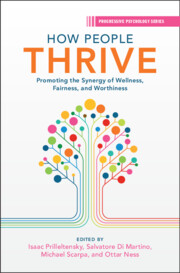28 results

How People Thrive
- Promoting the Synergy of Wellness, Fairness, and Worthiness
- Coming soon
-
- Expected online publication date:
- August 2024
- Print publication:
- 31 August 2024
-
- Book
- Export citation
Figures
-
- Book:
- How People Matter
- Published online:
- 20 May 2021
- Print publication:
- 17 June 2021, pp xv-xv
-
- Chapter
- Export citation
Advance Praise for How People Matter
-
- Book:
- How People Matter
- Published online:
- 20 May 2021
- Print publication:
- 17 June 2021, pp ii-viii
-
- Chapter
- Export citation
Acknowledgments
-
- Book:
- How People Matter
- Published online:
- 20 May 2021
- Print publication:
- 17 June 2021, pp xvi-xviii
-
- Chapter
- Export citation
Part III - Relationships
-
- Book:
- How People Matter
- Published online:
- 20 May 2021
- Print publication:
- 17 June 2021, pp 147-168
-
- Chapter
- Export citation
Dedication
-
- Book:
- How People Matter
- Published online:
- 20 May 2021
- Print publication:
- 17 June 2021, pp xi-xii
-
- Chapter
- Export citation
Notes
-
- Book:
- How People Matter
- Published online:
- 20 May 2021
- Print publication:
- 17 June 2021, pp 275-326
-
- Chapter
- Export citation
Copyright page
-
- Book:
- How People Matter
- Published online:
- 20 May 2021
- Print publication:
- 17 June 2021, pp x-x
-
- Chapter
- Export citation
Introduction
-
- Book:
- How People Matter
- Published online:
- 20 May 2021
- Print publication:
- 17 June 2021, pp 1-8
-
- Chapter
- Export citation
Chapter 4 - Ways to Matter
- from Part I - Understanding and Promoting Mattering
-
- Book:
- How People Matter
- Published online:
- 20 May 2021
- Print publication:
- 17 June 2021, pp 59-90
-
- Chapter
- Export citation
Chapter 6 - Mattering through Self-Regard
- from Part II - Self
-
- Book:
- How People Matter
- Published online:
- 20 May 2021
- Print publication:
- 17 June 2021, pp 121-146
-
- Chapter
- Export citation
Chapter 7 - Mattering in the Inner Circle
- from Part III - Relationships
-
- Book:
- How People Matter
- Published online:
- 20 May 2021
- Print publication:
- 17 June 2021, pp 149-168
-
- Chapter
- Export citation
Chapter 10 - Mattering in the Community
- from Part V - Community
-
- Book:
- How People Matter
- Published online:
- 20 May 2021
- Print publication:
- 17 June 2021, pp 219-242
-
- Chapter
- Export citation
Index
-
- Book:
- How People Matter
- Published online:
- 20 May 2021
- Print publication:
- 17 June 2021, pp 327-332
-
- Chapter
- Export citation
Chapter 9 - Mattering through Performance
- from Part IV - Work
-
- Book:
- How People Matter
- Published online:
- 20 May 2021
- Print publication:
- 17 June 2021, pp 194-216
-
- Chapter
- Export citation
Part V - Community
-
- Book:
- How People Matter
- Published online:
- 20 May 2021
- Print publication:
- 17 June 2021, pp 217-274
-
- Chapter
- Export citation
Chapter 11 - Mattering through Social Change
- from Part V - Community
-
- Book:
- How People Matter
- Published online:
- 20 May 2021
- Print publication:
- 17 June 2021, pp 243-274
-
- Chapter
- Export citation
Part I - Understanding and Promoting Mattering
-
- Book:
- How People Matter
- Published online:
- 20 May 2021
- Print publication:
- 17 June 2021, pp 9-90
-
- Chapter
- Export citation
Chapter 3 - Adding Value
- from Part I - Understanding and Promoting Mattering
-
- Book:
- How People Matter
- Published online:
- 20 May 2021
- Print publication:
- 17 June 2021, pp 45-58
-
- Chapter
- Export citation
Chapter 8 - Mattering in Teams
- from Part IV - Work
-
- Book:
- How People Matter
- Published online:
- 20 May 2021
- Print publication:
- 17 June 2021, pp 171-193
-
- Chapter
- Export citation



